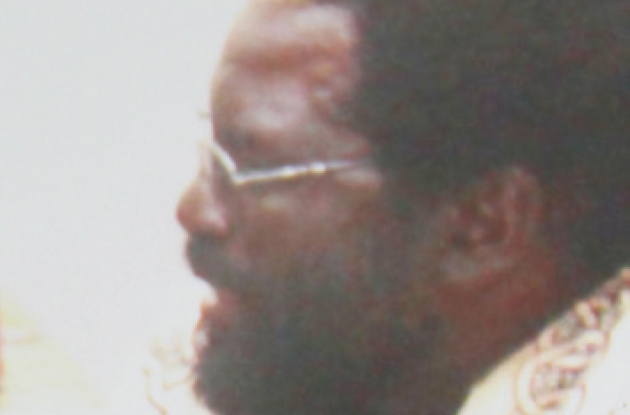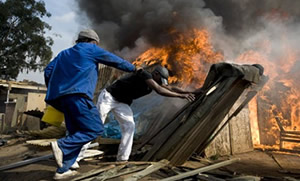Grey Chitiga: A misunderstood man

Obituary Arnold Mutemi
Grey Chitiga, the late former Chronicle senior photographer who died last week on Monday, was a greatly misunderstood man. In interactions with him, there were usually only two outcomes; either you got along with him or you didn’t. Most of the time there was no middle of the road. This was largely because Chitiga liked to speak his mind and some people are not comfortable with this. He was also headstrong at times. After the closure of Daily News, he was jobless but refused offers to join a close relative, his sister, I believe, in the United Kingdom. He believed home was best. That made him a patriot of some sort.
If it was some other person, they would have jumped at the opportunity to go and live abroad. But somehow, Chitiga didn’t fancy himself working as a carer or doing some other menial job which most Zimbabweans in the UK do.
To most young reporters in the Chronicle newsroom, Chitiga was a person to be avoided when going to assignments. Some reporters claimed that he was difficult to work with and only opted to take him on assignments when there was no other choice.
But the Chitiga I knew was different. He was a man who was easy to get along with. He had his strong opinions on some issues, but he was also prepared to listen to the other side.
Despite our age difference, I preferred going out of town assignments with him. As humans we would argue and disagree but all was later forgotten. He never held a grudge.
I recall a trip to the Lupane gas fields where we spent two nights. After successfully gathering material for the story we returned to Bulawayo. Along the way a heated argument arose. I don’t remember what triggered it but I know that for most of the journey back to Bulawayo, Chitiga, the driver and myself hardly spoke to each other.
However, as soon as we saw the Bulawayo city lights in the skyline, we became buddies again and it was as if nothing ever happened.
I had known Chitiga since I was a boy when he used to move around Gweru taking family portraits before the age of digital cameras. It must have been a lucrative job for him back in the 70s because he was driving his own car at a time when cars were still a true status symbol.
I got to know him professionally when I started my journalism career as an intern at Chronicle Gweru office where he used to frequently visit the then Bureau Chief, Isaac Waniwa, now managing editor.
Although he was not employed by Chronicle then, anyone looking for Chitiga in Gweru could just come to the Chronicle office, much to the chagrin of other office workers who would tell the inquirers that Chitiga did not work there if he was not around.
He became a sort of an unofficial photographer for Waniwa. I remember one picture of an accident in Gweru which was by-lined Isaac Waniwa. But looking closely in the picture, among the people viewing the accident scene was Waniwa himself, arms akimbo.
At the back of my mind I knew the picture had been taken by Chitiga.
While in Gweru, Chitiga also had a close relationship with then ZBC bureau chief Tapfuma Machakaire and provincial information officer Edwill Moyo.
Waniwa, Machakaire and Moyo gave Chitiga a nickname — Mushoma. I don’t know how the name came about but it stuck.
However, woe betide anyone who dared call him by that name except the three men.
Chitiga managed to forge a strong relationship with the late Makuwerere Bwititi who was supposed to takeover from Waniwa but was later transferred to Bulawayo on promotion as News Editor after a brief stint in Gweru. Bwititi later became Editor of the Chronicle.
During his days as a freelance, Chitiga was a shrewd photographer. He would take pictures without being commissioned and keep them in his files for years knowing he would make a killing one day.
His collection of pictures is a treasure trove of history going back to the 1970s. There are interesting pictures of prominent people taken long ago which I doubt exist anywhere else.
Chitiga didn’t regard himself as a street photographer like those who take wedding pictures at Centenary Park. He had a certain disdain for them because he felt they allowed themselves to be used by clients to sell pictures on the cheap out of desperation.
He used to put what he called a “professional charge” on his pictures and this cost him many clients who felt his services were too expensive. But he didn’t mind.
At one wedding in Gweru, he took pictures without being asked and had them printed at his own great expense hoping to recoup the costs after convincing the couple to buy them. He showed the pictures to the newlyweds who rudely told him to keep his pictures as they had their own official photographer.
Chitiga, ever humble in such circumstances, went away. A few days later, the couple was frantically looking for him. The negatives taken by their “official photographer” had been damaged during processing and Chitiga was the only person with memories of their happy day.
After Chitiga took his early retirement on health grounds, we regularly chatted on the phone. He would tell me of projects he wanted to start in his home area of Mhondoro in Mashonaland West province.
I remember him telling me about a truck he had bought which he wanted to use to transport produce from a local irrigation scheme to Mamina growth point in Mhondoro.
I last spoke to Chitiga about a month ago and there was no indication that he was about to leave us at such a relatively young age. Actually he told me he was feeling much better.
He then gave me an assignment and I am ashamed to say I procrastinated until it was too late.
Chitiga asked me to do two things for him. One was to research on when the Daily News titles actually closed down and the period they operated.
Chitiga was having problems accessing his benefits from the National Social Security Authority under the national pension scheme.
NSSA officials were insisting that he produce pay slips (which he misplaced as few of us still have pay slips from 10 years ago) to show that he once contributed to the scheme while the new Daily News management claimed that they did not have records from that period.
It is sad that Chitiga died without enjoying the benefits of his contributions.
He also wanted me to phone one of his children and ask them when they last spoke to their father.
There was no bitterness in him when he made this request. Just a father yearning to speak regularly to his children.
Rest in peace Grey Chitiga.








Comments